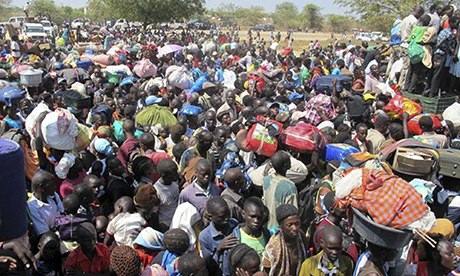
People seek refuge at a UN compound in Bor, South Sudan. Photograph: Hailemichael Gebrekrstos/AP
Barack Obama[1] has said South Sudan[2] "stands at the precipice" after political infighting spilled over into ethnic killings, claiming hundreds of lives including those of three UN peacekeepers.
Obama called on leaders in the world's newest country to show courage and halt the violence. He warned that otherwise "recent fighting threatens to plunge South Sudan back into the dark days of its past".
Some of the worst violence has come in Jonglei state, which is criss-crossed by some of South Sudan's most deadly ethnic faultlines. On Thursday youths from the Nuer community intent on revenge for alleged targeted killings of their kinsmen in the capital, Juba, overran the small UN outpost at Akobo, a remote town in the east of the state.
Two Indian peacekeepers were killed and one was injured trying to defend the base[3] from the mob, who also killed more than a dozen government officials from the Dinka community, South Sudan's most populous and powerful tribe.
Some 34,000 civilians have sought refuge in UN bases in the northern Unity State and Jonglei, and another 20,000 are sheltering with peacekeepers in Juba.
Foreign nationals still in South Sudan have crowded the airport in Juba desperate to escape. Britain's Foreign Office said that after an air evacuation of some UK nationals on Thursday, a second plane would arrive on Friday. "We strongly advise all British nationals in South Sudan to leave the country if they can do so safely. You may have difficulty leaving in the event of a further deterioration in security," it said in a statement.
South Sudan's president, Salva Kiir, has accused his former deputy[4] Riek Machar of attempting to launch a coup last Sunday. The pair, who have been rivals since the long civil war that ended in 2005 and split the country, had been in an uneasy power-sharing government since independence in 2011.
Kiir hails from the Dinka community, while Machar comes from the Nuer. The accusation that the former vice-president had attempted to seize power led to widespread reprisals against his supporters and fellow Nuer in the capital and surrounding areas. What began as a political power struggle has spilled over into open ethnic conflict in some areas.
In Unity State, which produces much of the oil that supports the economies of South Sudan and Sudan, fighting has led to oil workers fleeing the fields and reports suggest the government has lost control of the state capital, Bentiu.
In Jonglei a Nuer-led rebel militia, which claims its community is under attack by the government, has seized Bor, one of the country's most strategically important towns.
The militia made up of military mutineers from the Sudan People's Liberation Army (SPLA) has been raised under the command of the defected general Peter Gadet. After the storming of the UN base, Gadet said he would intervene to prevent further killings.
"It's an important distinction that the Akobo attack was not carried out by the armed opposition but by local youths," said Casie Copeland, a South Sudan expert with the Brussels-based monitor the International Crisis Group.
References
- ^ More from the Guardian on Barack Obama (www.theguardian.com)
- ^ More from the Guardian on South Sudan (www.theguardian.com)
- ^ were killed and one was injured trying to defend the base (www.theguardian.com)
- ^ accused his former deputy (www.theguardian.com)
Newer articles:
- South Sudan 'to drop charges against rebel leaders' - 24/04/2014 18:00
- South Sudan to free prisoners as pressure mounts for peace deal - 24/04/2014 18:00
- South Sudan treason charges dropped - 24/04/2014 16:36
- South Sudan president fires longtime army leader - 24/04/2014 15:15
- Embattled South Sudan president replaces army chief - 24/04/2014 14:34
Older news items
- Sudan seeks probe into killing of nationals in S.Sudan - 24/04/2014 10:56
- U.N. Security Council members considering South Sudan sanctions - 24/04/2014 10:55
- U.N. Considering Sanctions Over South Sudan Massacre - 24/04/2014 06:00
- U.N. Security Council members mulling South Sudan sanctions - 24/04/2014 05:29
- UN considering sanctions over South Sudan massacre - 24/04/2014 04:56
Latest news items (all categories):
- JUSTICE, OR VENDETTA? - The Consequences of Kirr's pursuit - 10/10/2025 21:43
- Palestine: An ongoing tragedy - 10/10/2025 21:35
- Sudan and South Sudan Sign Pact to Protect Oil Pipeline, Critical Oil Infrastructure - 10/10/2025 19:22
- RJMEC: "There is a risk of a large-scale resumption of civil war in South Sudan" - 10/10/2025 19:15
- How communities safeguard mental health in South Sudan - 10/10/2025 19:05
Random articles (all categories):
- دور قيادات شلو الدينية فى معالجة الازمة الراهنة - 28/07/2010 01:00
- Lack of trust slows Sudan-South Sudan deals: US envoy - AFP - 29/11/2012 10:50
- UNMISS facilitates recovery and resilience-building forum in Wau - 17/03/2021 06:52
- South Sudan’s humanitarian crises overshadow development needs - 27/05/2013 08:35
- UN Peacekeepers to Stay in South Sudan Through 2017 - 16/12/2016 17:29
Popular articles:
- Who is the darkest person in the world, according to Guinness World Record? - 25/10/2022 02:34 - Read 130905 times
- School exam results in South Sudan show decline - 01/04/2012 17:58 - Read 24453 times
- No oil in troubled waters - 25/03/2014 15:02 - Read 23462 times
- Top 10 weakest currency exchange rates in Africa in 2023 - 19/07/2023 00:24 - Read 23173 times
- NDSU student from South Sudan receives scholarship - In-Forum - 29/09/2012 01:44 - Read 20399 times
